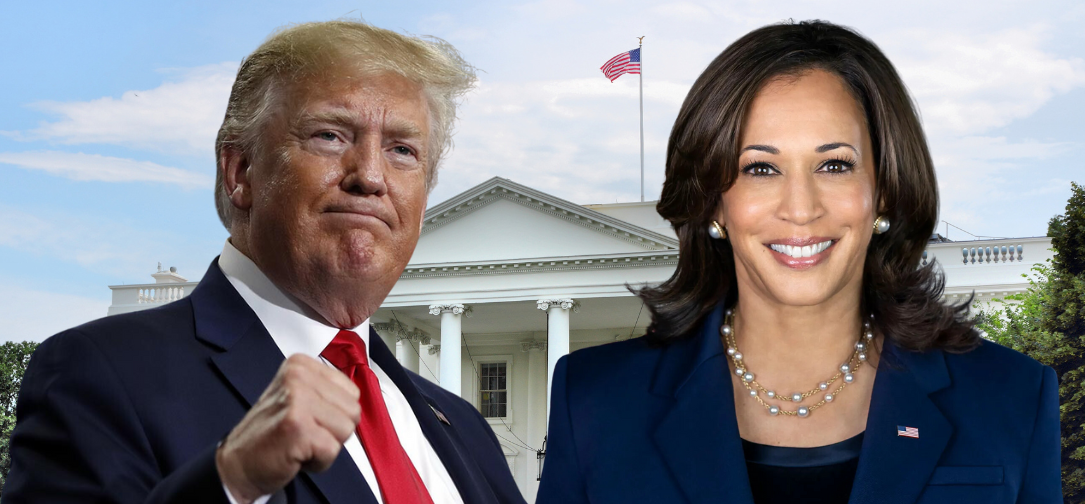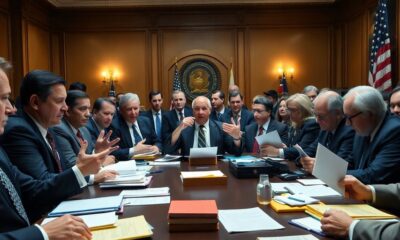USA News
What Is The Current Us Elections Rating And Who Is Leading The Polls?

As the United States approaches its highly anticipated 2024 presidential election, political tensions are reaching a crescendo, with pollsters, pundits, and the public analyzing every move of the candidates. This election is widely viewed as a pivotal moment in U.S. political history, with the stakes exceptionally high given the polarization that has defined much of the political landscape over recent years. The race primarily pits Vice President Kamala Harris, the Democratic nominee, against former President Donald Trump, the Republican contender seeking a dramatic return to the White House. An unexpected wild card, Robert F. Kennedy Jr., running as an independent, has further complicated the election dynamics.
To fully understand the nuances of the current race, we must look at the context of the candidates’ campaigns, key issues driving voter behavior, and the latest polling data. In this article, we’ll look deep into the most current facts and figures regarding the U.S. presidential election, explore the polling ratings, and offer an analytical look at who is leading the race.
1. The Candidates: Kamala Harris, Donald Trump, and the Impact of RFK Jr.
The primary candidates in the 2024 U.S. presidential election represent not only different political ideologies but also divergent visions of the future of the United States.
Kamala Harris
As the sitting Vice President, Kamala Harris is attempting to break through as the first woman president in U.S. history. Her candidacy is a continuation of the Biden administration’s policies, with a focus on progressive social policies, climate action, healthcare reform, and expanding civil rights. Harris has focused on portraying herself as a leader who will unite a fractured country, but she faces challenges due to her relatively lower favorability ratings compared to President Joe Biden, who opted not to run for re-election.
While Harris garners strong support from core Democratic voters, including women, minorities, and urban voters, her ability to inspire enthusiasm among younger and more moderate voters has been questioned. Many moderates in swing states are concerned about issues such as inflation and immigration, areas where Harris has yet to fully articulate a new direction from the current administration. This has left her vulnerable to criticism from the right and lukewarm enthusiasm on the left.
Donald Trump
Former President Donald Trump has, unsurprisingly, become the Republican nominee for the 2024 election after a hard-fought but ultimately uncontested primary. Despite facing numerous legal challenges and investigations, Trump remains highly popular among his base, capitalizing on a strong anti-establishment sentiment. He has campaigned on a platform of economic nationalism, promising to restore the U.S. economy, strengthen border security, and crack down on immigration. He continues to emphasize the importance of “America First” policies, particularly on trade and foreign relations, and he frequently attacks the “radical left” for what he calls their mismanagement of the country under the Biden administration.
Trump’s electoral appeal lies in his ability to maintain a strong connection with blue-collar voters, rural Americans, and working-class whites, particularly in the Midwest and Southern states. He also benefits from a loyal media ecosystem that reinforces his messaging. However, his legal troubles have caused concern among some swing voters and suburban Republicans who may find his unpredictability a liability.
Robert F. Kennedy Jr.
The emergence of Robert F. Kennedy Jr. as an independent candidate adds an unpredictable dynamic to the race. Initially, Kennedy announced a bid for the Democratic nomination but soon decided to run as an independent after failing to gain significant traction within the Democratic Party. Kennedy’s platform appeals to a segment of voters who are distrustful of both major parties. He has focused on issues such as government transparency, health freedom (notably his opposition to vaccine mandates), and a rejection of the mainstream political establishment.
Kennedy’s presence in the race has generated a split in polling data, with many analysts debating whether his candidacy will draw more support away from Harris or Trump. His appeal cuts across traditional party lines, drawing in some disaffected Democrats, libertarians, and even Republicans. However, his overall support remains relatively modest, typically polling in the single digits, though he could tip the balance in key swing states by siphoning votes from either major candidate.
2. The Polling Landscape: A Closer Look at the Numbers
Polling data as of October 2024 shows a highly competitive race, with both Harris and Trump effectively tied in national polls. According to various reputable poll aggregators, Harris currently holds a narrow lead, polling at approximately 48.6% nationally, compared to 46% for Trump. Meanwhile, RFK Jr. garners between 6% and 8% of the vote in different polls, with his impact being more pronounced in certain battleground states.
Despite the tight national race, the electoral college system means that state-level polls are far more consequential. Both Harris and Trump are focusing their campaigns on pivotal battleground states, such as Pennsylvania, Georgia, Michigan, and Arizona, where margins are razor-thin. These states are critical to securing the 270 electoral votes needed to win the presidency.
Key Swing States Polling Averages:
- Pennsylvania: Trump leads Harris by a narrow margin, polling at 48.2% to 47.9%. However, RFK Jr. could be a spoiler in this state, where he attracts up to 4% of the vote.
- Georgia: Harris is slightly ahead, with 49%, compared to Trump’s 47%, though again RFK Jr.’s 3-4% may influence the final outcome.
- Michigan: Harris leads with 50% compared to Trump’s 45%, a critical lead in a state that Trump won in 2016 but lost in 2020.
- Arizona: Polls show Trump with a slight edge at 48.5%, compared to Harris at 48%, while RFK Jr. holds about 3.5%.
These state-level dynamics highlight the importance of the electoral college system, where the race is likely to be decided by a handful of swing states, rather than the national popular vote.
3. Key Issues Driving the Election
The issues that are most influencing voters in the 2024 election reflect the nation’s broader concerns and the partisan divides that have defined American politics in recent years.
The Economy
Economic issues are paramount in the 2024 election, with inflation, job creation, and wages dominating the discourse. Trump’s message of restoring “economic greatness” resonates strongly with working-class voters who feel left behind by globalization and economic shifts during the Biden-Harris administration. Harris, on the other hand, defends the economic policies of the Biden administration, pointing to job growth and investments in infrastructure, but inflationary pressures remain a significant challenge for her campaign.
Immigration and Border Security
Immigration continues to be a focal point, especially for Trump, who has pledged to reinstate strict border security measures and policies such as the construction of a southern border wall. Harris has advocated for more comprehensive immigration reform, though this issue has been a point of vulnerability for her campaign. Polls show that immigration is one of the top concerns for swing voters, particularly in border states such as Arizona and Texas.
Health Care
Health care reform remains a critical issue, with both candidates offering contrasting visions. Harris supports expanding access to healthcare through programs like the Affordable Care Act, while Trump favors market-based solutions and has promised to lower prescription drug prices. The pandemic and vaccine mandates remain contentious, with RFK Jr. capitalizing on the anti-vaccine sentiment among certain voter demographics.
Abortion and Women’s Rights
The overturning of Roe v. Wade in 2022 has elevated the issue of abortion rights in this election. Harris has positioned herself as a staunch defender of reproductive rights, which resonates with many suburban and female voters. Trump, while praising the Supreme Court decision, has focused on portraying himself as a protector of religious and conservative values, appealing to evangelical voters.
4. What the Polls Reveal About Voter Demographics
Understanding the breakdown of voter demographics is essential to interpreting polling data. In the 2024 race, the following key demographic groups are particularly influential:
- Suburban Voters: Suburban voters, particularly suburban women, are a highly contested group. Harris has been performing well among this demographic, especially on issues such as abortion rights and healthcare. Trump, however, continues to appeal to suburban voters concerned about crime, inflation, and immigration.
- Minority Voters: Harris, as the first Black and South Asian female vice president, has strong support among African American and Asian American voters. However, Trump has made inroads with Latino voters, particularly among those who lean more conservative on issues like immigration and religion.
- Young Voters: Younger voters, particularly those under 30, have been a traditionally Democratic bloc, but Harris has struggled to mobilize them as effectively as Biden did in 2020. Issues like climate change and student debt relief are important to this demographic, but turnout remains a concern.
- White Working-Class Voters: Trump continues to dominate among white, working-class voters without college degrees. His focus on trade, jobs, and anti-establishment rhetoric plays well with this group, which is concentrated in key swing states like Ohio and Pennsylvania.
Conclusion: Who is Leading?
As of mid-October 2024, polling data suggests a razor-thin race between Kamala Harris and Donald Trump. While Harris holds a marginal lead nationally, the outcome will depend heavily on swing states, where both candidates are neck and neck. Robert F. Kennedy Jr.’s independent candidacy adds an element of unpredictability, with his support siphoning votes from both majorstates, remains a formidable challenge for political analysts. The national polls offer a snapshot, but in the intricate web of the Electoral College, state-by-state dynamics will ultimately decide the election.
The key battlegrounds, including Pennsylvania, Georgia, Michigan, and Arizona, are where the campaigns are focusing their efforts, and it is here that the election will likely be decided. Both Kamala Harris and Donald Trump are neck and neck in these critical states, with Robert F. Kennedy Jr.’s independent run further complicating the scenario by drawing votes away from both candidates, potentially flipping key electoral college votes.
Final Reflections
As we edge closer to Election Day in November 2024, the U.S. presidential race remains highly competitive and unpredictable. The current polling data indicates that Kamala Harris has a narrow national lead over Donald Trump, but state-level contests tell a more complex story. The presence of RFK Jr. as an independent candidate introduces further uncertainty into the mix, as his influence on the electorate could tip the balance in tightly contested states.
Critical issues like the economy, immigration, healthcare, and women’s rights are driving voter sentiment, while demographic groups such as suburban women, minority voters, and young Americans are pivotal to the outcome. Both Harris and Trump have their strengths and weaknesses across these various groups, and the final weeks of the campaign will see intense efforts to consolidate support in swing states.
In conclusion, while Harris is technically leading in the polls by a slim margin, Trump’s strong base and ability to connect with key voting blocs, particularly in crucial swing states, means that the election is still very much in play. The race remains fluid, and any late-breaking developments or shifts in voter sentiment could drastically alter the final outcome.
With just weeks to go, the 2024 U.S. presidential election promises to be one of the closest and most consequential in recent memory. As always, voter turnout, last-minute campaign strategies, and unforeseen external events will likely shape the final results in ways that no poll can fully predict. The only certainty is that this race, like many before it, will be one for the history books.
-

 Press Release4 days ago
Press Release4 days agoNura Labs Files Revolutionary Patent: AI-Powered Wallet Solves the $180 Billion Crypto Staking Complexity Crisis
-

 Press Release2 days ago
Press Release2 days agoGlobal Compound Feeds and Additives Industry Report: Market Expansion and Competitive Insights to 2035
-

 Technology2 days ago
Technology2 days agoWhat to Know Before Switching Cell Phone Network Services in 2025
-

 Press Release10 hours ago
Press Release10 hours agoCrypto WINNAZ Launches First On-Chain Yield Engine for Meme Coins, Enabling 20x–300x Returns


































